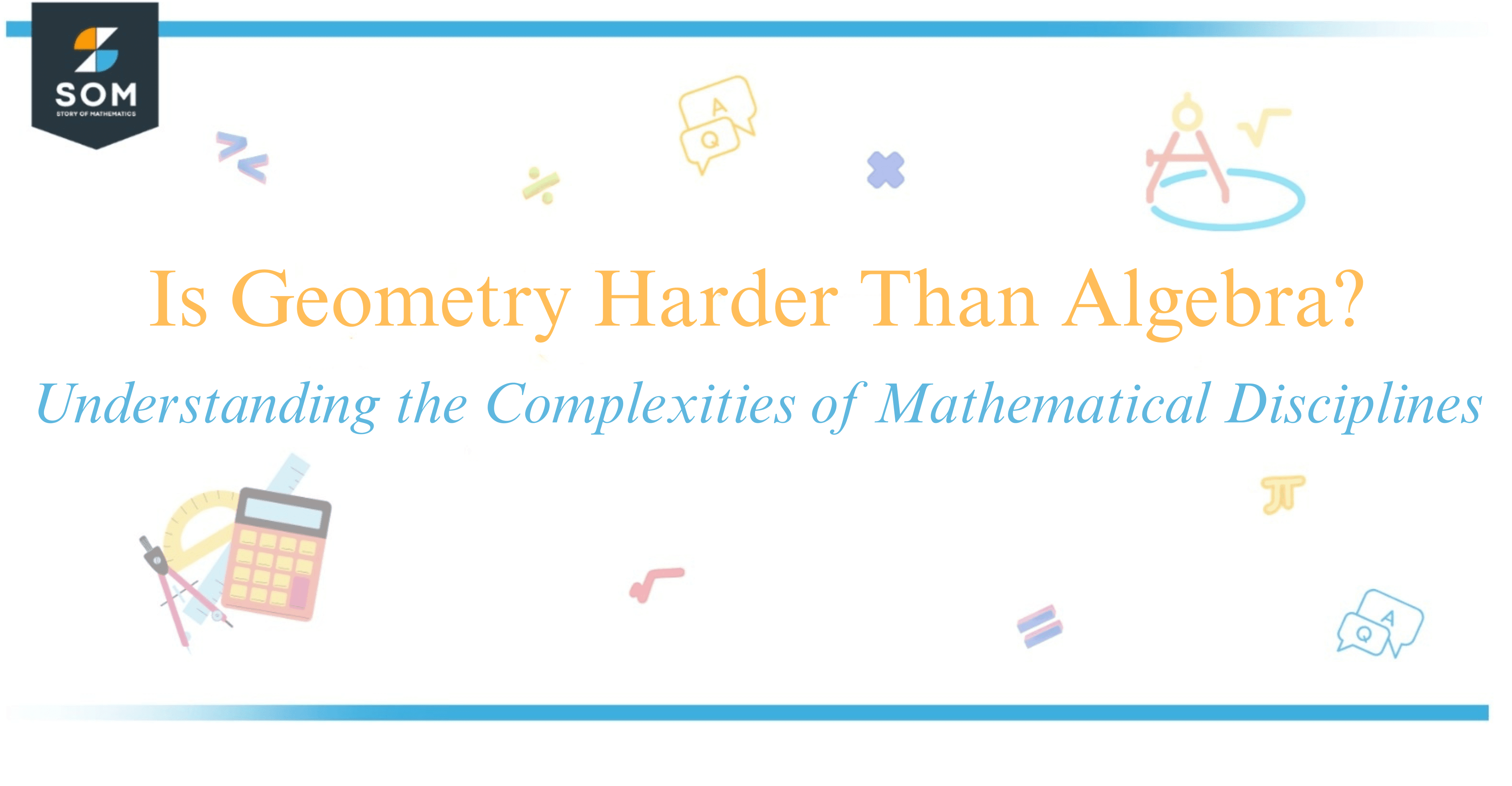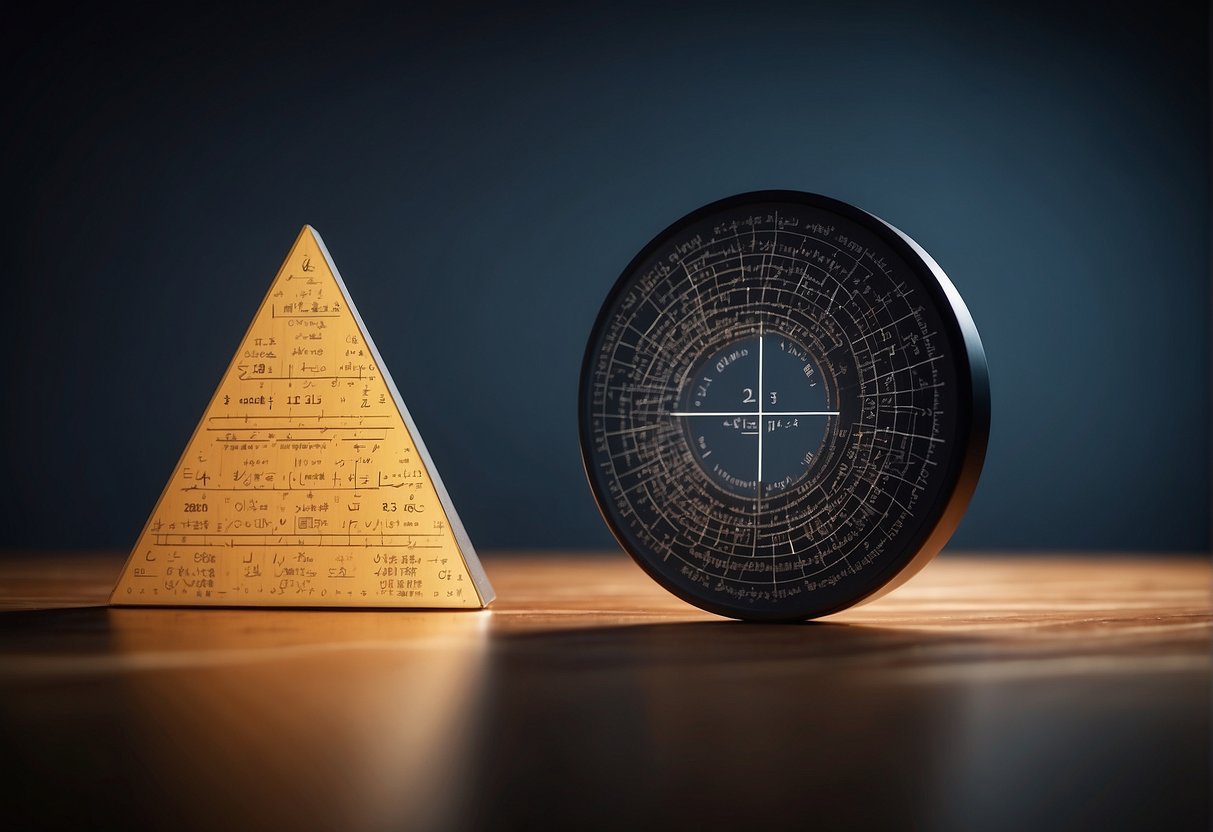JUMP TO TOPIC

Is geometry harder than algebra? The difficulty of geometry or algebra can be quite subjective depending on a student’s strengths and interests; however, many find geometry to demand a different skill from algebra.
Geometry often involves more spatial reasoning and the memorization of various rules and theorems, which can be challenging for those who prefer the more formulaic and numerical operations of algebra.
On the flip side, algebra requires strong capabilities in manipulating variables and understanding abstract concepts that can seem daunting to those who thrive on the tangible aspects found in geometry.

In my experience, whether one finds geometry or algebra harder depends much on their personal cognitive preferences.
I’ve noticed that students who are more visually inclined and enjoy drawing and visualizing shapes may gravitate toward geometry more easily.
Conversely, those who love working with numbers and abstract concepts might find solace in the logical structure of algebra. It’s important to recognize that both geometry and algebra are crucial foundations of mathematics, and excelling in both is beneficial for a well-rounded mathematical education.
Stick around to explore the unique challenges of both geometry and algebra and perhaps discover which resonates most with you.
Difficulty Levels in Geometry and Algebra
When I reflect on my time in high school and the math classes I took, my experience was quite common: some students found geometry to be challenging, while others struggled more with algebra.
The level of difficulty often depends on a student’s learning style. Let me guide you through a comparison that might clarify why this happens.
Geometry is visually intensive and involves a lot of spatial reasoning. Math teachers often emphasize the need for understanding shapes, theorems, and proofs.
It requires memorizing various rules and formulas which can seem daunting. For example, the Pythagorean theorem is $a^2 + b^2 = c^2$, where a and b are the legs of a right triangle, and c is the hypotenuse.
On the other hand, algebra, including Algebra 1 and Algebra 2, is seen as more abstract and symbolic. It involves the manipulation of numbers and variables – such as solving for $x$ in an equation like $2x + 3 = 7$. It often appeals to those who enjoy logical problem-solving and the application of step-by-step procedures.
| Subject | Skills Required | Sample Concepts |
|---|---|---|
| Geometry | Visual-spatial reasoning, memorization | Theorems, proofs, area and volume formulas |
| Algebra | Abstract reasoning, logical problem-solving | Linear equations, quadratic functions |
My experience tells me that some students excel in geometry because they have strong visual and spatial awareness. In contrast, others are better at algebra thanks to their ability to grasp abstract concepts and work through logical steps to solve problems.
The curriculum in most schools introduces these subjects sequentially, which allows each student to identify which subject suits their strengths better. With the help of supportive teachers and resources, any initial difficulty in either subject can be overcome.
Fundamental Differences Between Geometry and Algebra
Geometry and algebra are two vital branches of mathematics, each with unique approaches to problem-solving. In algebra, I focus on abstract concepts like variables and equations to represent numbers and their relationships.

It requires a solid logical foundation and often involves the manipulation of these symbolic representations to solve for unknowns, expressed as:
- Equations: $ax^2 + bx + c = 0$
- Variables: $x$, where $x$ represents an unknown value.
Conversely, geometry deals with physical shapes and the relationships between points, lines, surfaces, and solids in space.
It’s more visual, demanding a good sense of spatial relationships and the ability to remember and apply various theorems and formulas. For instance, understanding the Pythagorean theorem:
- Shapes: Triangles, circles, rectangles.
- Theorems: Pythagorean theorem, $a^2 + b^2 = c^2$, for right triangles.
My experience with geometry often involves more memorization of rules and formulas than algebra. While algebra does require me to remember certain operations and properties, the emphasis is more on applying logic to manipulate formulas and solve for numeric values.
| Aspect | Algebra | Geometry |
|---|---|---|
| Focus | Abstract concepts, numbers | Visual, spatial relationships of shapes |
| Core Skill | Logic, manipulation of symbols | Memorization of rules, intuitive understanding |
| Representation | Symbolic, using equations | Visual aids, like diagrams and sketches |
| Problem-solving | Analytical, step-by-step processes | Often based on visual and spatial reasoning |
In summary, algebra tends to be symbolic and abstract, deeply rooted in numerical and logical thinking. Geometry, however, leans toward visual and spatial understanding, where the physical aspects of shapes and space come to the forefront.
Both subjects play distinct and crucial roles in the wider field of mathematics, and my appreciation for each comes from their respective contributions to our understanding of the world through numbers and forms.
Real-World Applications of Geometry and Algebra
Geometry and algebra are cornerstones of mathematics that have vast applications in the real world. I’ll focus on how these branches of math are fundamental to academic pursuits and essential in various professional fields.
In art, algebra helps artists understand proportions and create compositions with balance and harmony. Geometry allows them to explore forms, perspectives, shapes, and symmetries within their creations.
Architecture relies heavily on geometry for planning and designing buildings and structures. Architects use geometry to ensure stability and aesthetics, from the Pythagorean theorem for right triangles to more complex geometric shapes in modern designs.
In the field of engineering, both algebra and geometry are vital. Engineers use algebraic equations to calculate forces, loads, and material stresses. Geometry is applied to design elements like bridges, where shapes such as arches and trusses distribute weight efficiently.
Computer graphics use both algebra and geometry to create visual imagery. Algebra forms the basis for algorithms that process images, while geometry helps to model three-dimensional objects and scenes in virtual environments.
Science, particularly physics, relies on algebra to express relationships and laws, such as ( F = ma ) where force equals mass times acceleration. In geometry, concepts like vectors and coordinates are crucial for describing physical phenomena in space.
Let’s not forget the practical applications of algebra in daily tasks like managing finances or understanding growth rates. Geometry’s practical uses range from navigation to the arrangement of goods and services in spaces.
Here’s a summary in table form:
| Field | Algebra Application | Geometry Application |
|---|---|---|
| Art | Calculating proportions, creating balance | Exploring shapes and symmetries |
| Architecture | Material stress calculations | Designing complex structures |
| Engineering | Force and load calculations | Designing efficiently shaped elements |
| Computer Graphics | Image processing algorithms | Modeling 3D graphics |
| Physics | Representing physical laws | Describing spatial phenomena |
In conclusion, both geometry and algebra are not only academic subjects but also fundamental tools in multiple professional realms that shape the world around us.
Advancement in Mathematical Studies
In my exploration of mathematical studies, advancements are constantly reshaping how we view and learn advanced topics. Khan Academy, for instance, has revolutionized the community by providing free, accessible education in subjects like Algebra II, Geometry, and Calculus for students around the globe.
Let me give you a snapshot of the resources I’ve found particularly helpful:
- Trigonometry: Interactive tools such as calculators that visualize trigonometric functions.
- The Pre-Calculus: Tutorials that demystify concepts like logarithms.
- Calculus: Step-by-step guides for tackling integrals and derivatives.
Here’s how these tools have an impact:
| Tool | Influence on Learning |
|---|---|
| Interactive Calculators | Simplified complex concepts |
| Khan Academy | Democratized access to education |
| Online Forums | Cultivated a support community |
I’m constantly amazed at the way technology aids my studies. With easily accessible online tools, algorithms can solve intricate equations, and logarithm tables from my high school days have been replaced by sophisticated digital calculators.
Additionally, algorithms behind these platforms adapt learning paths, tailoring the difficulty level and offering personalized practice problems in subjects like Geometry and Algebra.
Moreover, the advancement in mathematical studies isn’t just about the tools. The availability of a supportive community has made a difference in my learning experience.
When I’ve struggled with difficult topics like calculus, a quick search online often leads to forums where advanced students and educators discuss and dissect complex problems.
Conclusion
In my journey through mathematics, I’ve encountered both algebra and geometry, each presenting its unique challenges. Algebra involves the manipulation of symbols and abstract concepts, such as solving equations like $ax + b = c$.
Meanwhile, geometry is the study of shapes, sizes, and the properties of space. It emphasizes visual understanding and proofs, often requiring spatial reasoning skills.
As to which subject is more challenging, there is no definitive answer. For some students, algebra is more intuitive because it follows a clear set of rules for solving equations. In contrast, others may find geometry easier due to its concrete visual elements.
Each individual’s experience with these subjects can be immensely different based on their strengths. While one might excel in the abstract reasoning required for algebra, another might thrive when engaging with the tangible aspects of geometry.
The question of difficulty between algebra and geometry should not be a generalization but rather a reflection of personal aptitude and preference.
My advice is to acknowledge your strengths and seek support in areas of difficulty, whether they lie in algebra, geometry, or any other subject within the vast realm of mathematics.
